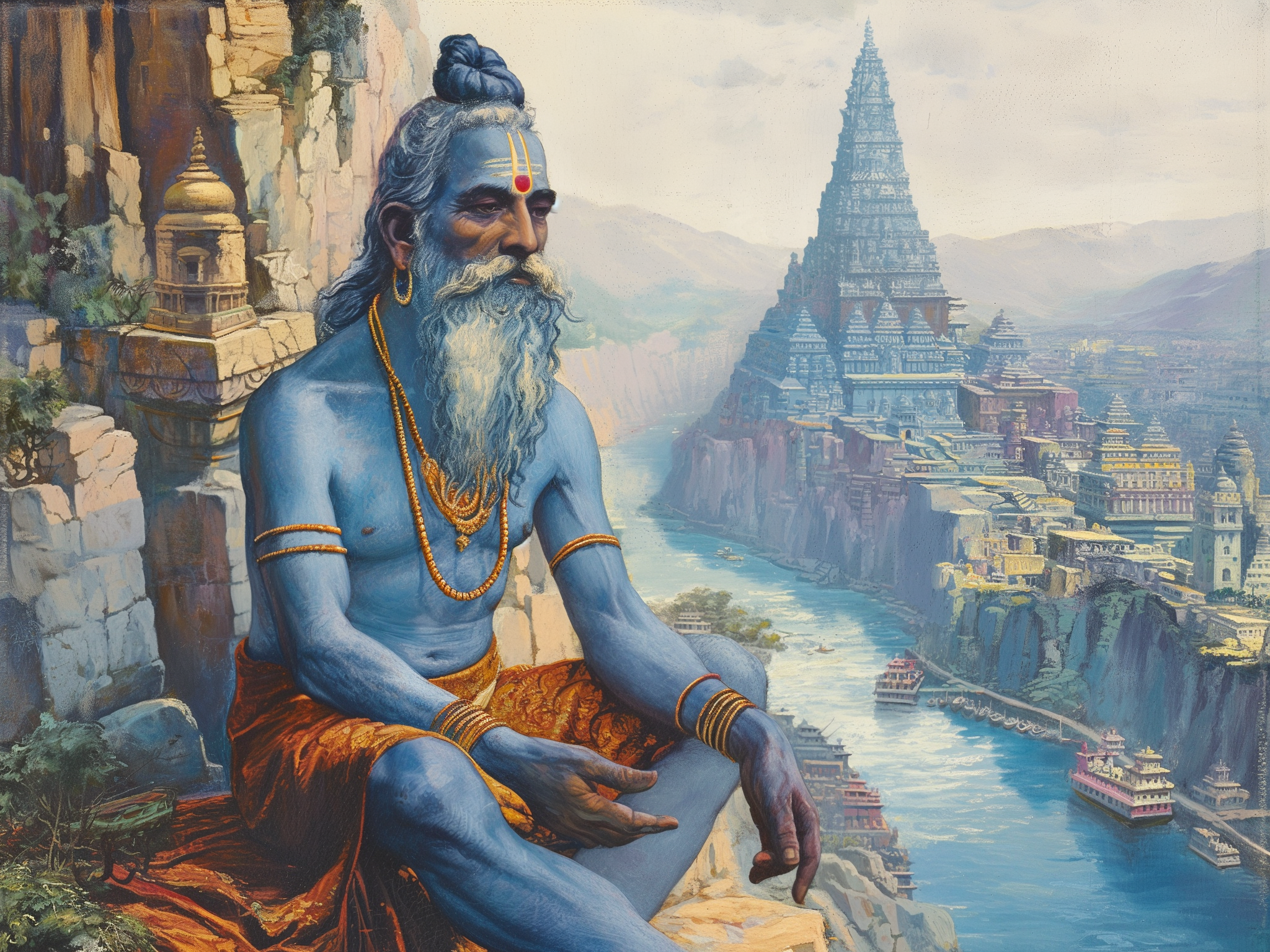Śrī Śrī Vyāsa-pūjā - The Worship of Śrī Vyāsadeva

The methodology of conducting śrī vyāsa-pūjā
The great festival of śrī vyāsa-pūjā, or śrī guru-pūjā, commemorating the appearance day of Nitya-līlā-praviṣṭa Oṁ Viṣṇupāda Śrī Śrīmad Bhaktisiddhānta Sarasvatī Gosvāmī Prabhupāda, crown jewel among the clan of swan-like saintly personalities and the spiritual master of the whole world, has been conducted with great celebreation in all the branches of Śrī Gauḍīya Vedānta Samiti. The festival was held under the guidance of Śrī Gauḍīya Vedānta Samiti’s founder, Gauḍīya-vedāntācārya Oṁ Viṣṇupāda Śrīla Bhakti Prajñāna Keśava Gosvāmī Mahārāja, who in present times is the guardian of that supremely pure lineage comprised of the followers of Śrī Rūpa Gosvāmī and who fulfils the cherished desires of Śrīla Jagannātha dāsa Bābājī Mahārāja, Śrīla Bhaktivinoda Ṭhākura, Śrīla Gaura-kiśora dāsa Bābājī Mahārāja and Śrīla Sarasvatī Ṭhākura Prabhupāda.
The śrī vyāsa-pūjā conducted by Śrī Gauḍīya Vedānta Samiti is uniuqe as it follows the very same methodology adopted by Śrī Nityānanda Prabhu in His worship of Śrī Caitanya Mahāprabhu in the house of Śrīvāsa Paṇḍita. Jagad-guru Śrīla Bhaktisiddhānta Sarasvatī Prabhupāda himself extracted, with great difficulty, this same methodology of worship (pūjā-paddhati) from the Govardhana Maṭha of the Śaṅkara sampradāya in Purī. It was then corrected and expanded by the Seventh Gosvāmī, Śrīla Bhaktivinoda Ṭhākura. This paddhati was published when Śrīla Bhaktisiddhānta Sarasvatī Gosvāmī was still present in this world, but practice of it did not become prevalent. After the departure of Śrīla Prabhupāda, however, his dearly beloved Oṁ Viṣṇupāda Śrī Śrīmad Bhakti Prajñāna Keśava Gosvāmī Mahārāja, fulfilled the heartfelt desire of Śrīla Prabhupāda by promoting this paddhati. Thus, he established the topmost ideal of śrī guru-sevā. This activity is more valuable and significant than constructing any large temple for Śrīla Prabhupāda. Śrīla Prabhupāda, in his own words, has confirmed this: “We have not come into this world to become craftsmen of wood and stone. We are only bearers of the message of Śrī Caitanya-deva.” Therefore, the greatest example of guru-sevā is to fulfil śrī guru’s heartfelt desire by preaching his message throughout the whole world.
The meaning of “vyāsa” and Śrī Kṛṣṇa Dvaipāyana Vedavyāsa
The word vyāsa means “to expand”. In other words, the person who compiled, divided and produced [published] the Vedas, who authored invaluable scriptures like the eighteen Purāṇas, the fifth Veda, or Mahabhārata, as well as Vedānta-darśana and Śrīmad-Bhāgavatam, who personally travelled throughout the world, illuminating it with the light of knowledge realized in his samādhi, thus spreading the name, form, qualities and pastimes of the Śrī Bhagavān everywhere, is renowned in Indian vernacular as Śrī Kṛṣṇa Dvaipāyana Vedavyāsa.
Śrī Kṛṣṇa Dvaipāyana Vedavyāsa is not some ordinary poet, author, karmī (fruitive worker), jñānī (seeker of monistic knowledge), or bhakta (devotee). He is a śaktyāveśa-avatāra (an empowered manifestation of the Supreme Lord) who descended to this world out of his own accord because his heart was melting with compassion upon seeing the destitute state of the conditioned souls. He has manifested so many scriptures for the benefit of mankind that it is not possible for any one person to complete reading all of them in one lifetime. There is no subject in this world left untouched, nothing that cannot be found in the literature manifested by Śrī Vedavyāsa, as it contains the laws of religion, politics, and society, as well as poetry, grammar, metre, astrology, philosophy, science and so forth.
Śrī Vedavyāsa: the foundation of Indian culture
Śrīmad-Bhāgavatam and Śrī Gītā are respected by every community in the world, whether its people are educated or uneducated, rich or poor. The human heart, terrified and agitated by a destructive society, is in search of fearlessness and peace. The eternal and transcendental message of Śrīmad-Bhāgavatam and Śrī Gītā can provide them these two necessities. These two scriptures contain the most astonishing solutions to all the problems of all living beings residing in all locations around world, in all epochs. Ancient India led the entire world for a long time solely on the strength of the words of Śrī Vyāsadeva.
Although India today has lost its everything, lagging behind other countries in all areas – economic, societal, political and scientific – nonetheless, on the strength of its ancient culture and principles, the ethics and values of which Śrī Vyāsadeva is the very foundation, India still holds its head high in the world. If Śrī Vyāsadeva is separated from Indian culture, from Indian ideology and philosophy, then India becomes devoid of any essence, like a temple without a deity or a body without a soul.
External advancement and internal deterioration
Nowadays, all the nations of the world are fully occupied with implementing manufacturing and development. Why has India begun to lag behind? Note, however, that while on one hand, agriculture, commerce, handicrafts, and various industries are being developed, on the other hand, the evils of bribery, fraud, theft, robbery, exploitation, corruption and the threats and fear of murder and war are causing the human heart much pain and agitation. Though external and material progress is visible, spiritual and moral values are rapidly deteriorating day by day.
While on one side, there is an uproar for world peace, non-violence and the principles of the Panchsheel [five principles for peaceful coexistence stated in the Sino–Indian Agreement of 1954], at the same time, cows, which are the emblem of Indian culture, other animals, and countless humans on the stage of political wars, are being massacred. In our opinion, the so-called educated and advanced society of today is proving itself to be far more destructive and ruthless than the illiterate and barbaric, or primitive, tribes of any millennium.
India, too, has started striving toward these external developments with all its might. New schools and colleges are being opened, new dams are being constructed, new industries are being established, new roads are being built and new research laboratories are being founded, but in spite of all this, hardly any positive fruit is visible. There is still a scarcity of food and proper education, and malpractices and immorality are rampant. Corruption is everywhere.
What is the reason for all this? If we deliberate on this sincerely, we will realize that although we are giving importance to external and material development, due to thinking such external advancement to be the source of all peace and happiness, we are completely neglecting internal, or spiritual, development and disregarding ancient Indian culture – its values and principles. We should not forget that Śrī Vedavyāsa alone is the foundation of Indian culture and spiritualism. The construction of a new India devoid of this internal, or spiritual, development is like a marriage party without the groom. Therefore, unless India learns to pay respect to the teachings of Śrī Vyāsadeva and offer him worship, for it to hope for true advancement or real welfare is like expecting fruit from a dried-up tree.
The key to eternal peace and happiness
It is evident that India’s materialistic outlook on development is absolutely external and incomplete. The question worth contemplating now is this: What is the true welfare or real goal and by what means is it to be achieved? Śrī Vedvyāsa has said that none of the following achievements, such as the post of Brahmā, the kingdom of heaven, the emperorship of this world, the dominion of the lower planetary systems, attaining suprahuman yoga perfections or even attaining liberation, is the topmost goal and worth achieving:
na pārameṣṭhyaṁ na mahendra-dhiṣṇyaṁ
na sārvabhaumaṁ na rasādhipatyam
na yoga-siddhīr apunar-bhavaṁ vā
mayy arpitātmecchati mad vinānyat
Śrīmad-Bhāgavatam (11.14.14)
“Those who have surrendered their hearts to Me do not desire the positions of Brahmā or Indra, sovereignty over the whole Earth, the kingdom of the lower planets, mystic perfections such as aṇimā, or even the state of liberation. They desire nothing but Me.”
Instead, Śrī Vedavyāsa considers that service to Śrī Kṛṣṇa or attaining kṛṣṇa-prema is the topmost goal for all living souls. It is his teaching that the soul is a conscious being. The eternal constitutional position (svarūpa) of a living being is that of a servant of Bhagavān. This alone is his true nature and is called the dharma of an entity. The root cause of entanglement in this world and the root cause of all material miseries is solely the misuse of this constitutional nature, or dharma. All birds and animals, plants, creepers, grass etc. are our kin. It is our duty to liberate them from the clutches of māyā.
This alone is the source of peace and eternal happiness. Modern society wishes to attain peace and happiness through worldly means and material advancement, but if we glance through the history of bygone ages, we realize that material affluence is never the source of true welfare. In fact, in most cases, material affluence becomes an impediment on the path to true welfare. India will therefore have to turn to the teachings of Śrī Vyāsadeva.
Unless the wisdom to distinguish spirit from non-spirit awakens, unless one gains knowledge about what is conscious and what is not, and unless one does not relinquish all dharma related to one’s body and mind and engage in exclusive service to Śrī Bhagavān, the topmost welfare cannot be attained. As instructed by Śrī Vyāsadeva, the means to attain this topmost welfare is harināma-saṅkīrtana. In his scriptures, he has repeated this teaching multiple times.
Therefore, if we are to become truly exalted, our first and foremost duty is to learn to worship Śrī Vyāsadeva. He is the life air (prāṇa) of Indian culture and civilization. Not only India but the whole world is eternally indebted to him and shall remain so forever. Therefore, our foremost duty is to accept our indebtedness to him and worship him. To worship him means to realize the greatness of his teachings and practise them in our own life, thereby building our own character, our society and our nation. In this way, gradually cultivating a connection with the Supreme Reality (parama-tattva) by engaging in hari-bhajana, the living being can make progress on the path of sādhana and gradually attain kṛṣṇa-prema, the topmost goal of human life.
